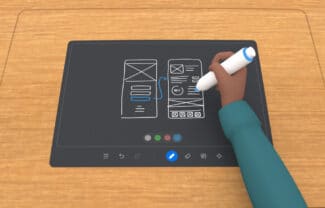They say third time is the charm, right?
Facebook’s previous efforts in social VR haven’t fared so well. The original Oculus Rooms social framework kind of died a dark quiet death and, in 2017, Facebook Spaces became a focal point for VR’s awkwardness when CEO Mark Zuckerberg live broadcast himself as a particularly cartoonish avatar high-fiving another Facebook executive while surrounded by a 360-degree video of a hurricane-ravaged Puerto Rico.
But gone are the limitations inherent to the Oculus Go, Gear VR and Oculus Rift headsets on which those social platforms briefly existed before they were formally shut down near the end of 2019. In their place, Facebook announced Horizon, a sprawling effort which seemed to target the holy grail of social VR — the ability to shape a world while embodied inside of it. Since announcement, the Horizon platform has rolled on quietly in limited release because, perhaps, it turns out there’s a pretty big gap between simply shaping worlds from VR and shaping worlds that people actually want to visit regularly.
Meanwhile, Facebook’s hardware teams started hitting their stride empowered by a clear long-term goal of getting as many people as possible wearing the company’s hardware. The Oculus Quest 2 is becoming a self-contained VR personal computer and it sells for an unmatchable price of $299. Next week, it goes back on sale with double the internal storage. Altogether, Facebook’s executives feel VR is reaching a tipping point and, amid the continuing COVID-19 pandemic, they’ve offered to buy every single one of the company’s 60,000+ employees a Quest 2.
So while Facebook might’ve bitten off more than it could chew with Horizon (in 2019 at least), a year and a half into a pandemic forcing employees onto an endless carousel of mind-numbing video calls seems to have honed the company’s social VR efforts into a pretty slick new offering: Horizon Workrooms.
“Workrooms is really, we think, the beginning of a unique inflection point for VR,” said Mike LeBeau, Director of FRL Work Experiences. “It’s something we’ve talked about for a long time in terms of future computing platforms and all of that. But this is a moment we think where we’re actually starting to really adapt the medium to that end.”
I recently tried out Horizon Workrooms and came away pretty impressed by what they’re doing. Here’s a look at five things that set the new effort apart.
Incredible Audio

The audio inside Horizon Workrooms is simply incredible. Facebook says they’re incorporating both directionality and reverberation into a low-latency audio pipeline. What’s that mean exactly? You can close your eyes and pinpoint exactly where someone is seated in the room without looking at them, and you can even tell whether they’re facing you or turned toward a whiteboard.
Oculus Touch Reimagined
Facebook explained up front that its teams designed Horizon Workrooms for controller-free hand-tracking first. That’s to be expected since the company has made no secret of aiming to one day ship a headset that can sell at even lower prices because it’s just a headset in a box — controllers sold separately. We use hand tracking every week for our in-VR studio broadcasts and we love how expressive it allows us to be, so it’s not really new. Still, my mind sorta blew apart in Horizon Workrooms when I realized they’d decided they could completely reimagine how you can use an Oculus Touch tracked controller. You can have a whiteboard on the surface of your desk in the software, and they suggest you pick up a Touch controller in your writing hand and hold its base exactly like a pen. After a quick calibration step with the desk, you can simply press the handle of the controller against the table and voila, you’ve got a decent writing implement.
Appointment-based

VR takes some effort to get into. Just to begin to think about meeting up with someone in VR you’ve got to make sure your headset is charged, turned on, and the headset’s fitting is just right for your particular head shape. And just right there you’ve caused plenty of missed connections. That’s why I think VR shares a lot in common with appointment-based entertainment, like waiting for a new TV show to premiere at a specific time or pre-planning a time to meet a friend for a round of mini-golf. Horizon Workrooms effectively leans into this by making it very easy to schedule meetings from a Web-based interface.
Mixed Reality’s Beginnings

You can bring your desk into Workrooms and the software can track and show the location of some Mac keyboards and the Logitech K830 bluetooth keyboard to other people in the room. You can also see a passthrough view of your fingers hovering over the keys, so if you lose your place on the keyboard you can find it again without taking the headset off. Facebook is calling this “mixed reality” and it opens the door to a lot of really fun ideas in the future. Could we one day have a cat sharing feature, for instance, so that if a pet should wander into your work area their location could be shown to the other people in the room? Or, perhaps more usefully, what about document scanning? If you place a piece of paper on your desk could you one day scan and copy it for everyone in the room, just by looking at it?
It’s Not All About VR

Horizon Workrooms supports up to 16 people in VR together and up to 50 people total when adding in those calling in over video. While those using Quest 2 need a Facebook account, those joining from a video call just need “a Workrooms account, which is separate from your Oculus or Facebook accounts,” according to the company. Put another way, they’ve created a social platform that doesn’t require a VR headset or a Facebook account to have an interaction and, once you’re there, you’ll have a front row to some of your closest contacts demonstrating exactly what you get when you take the plunge.







